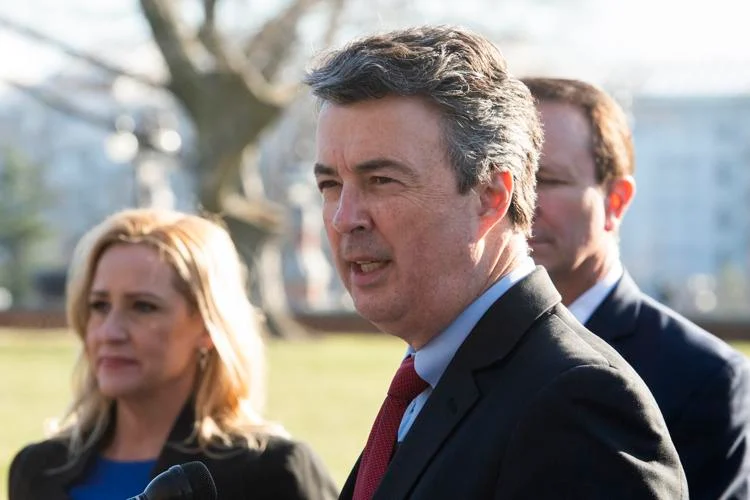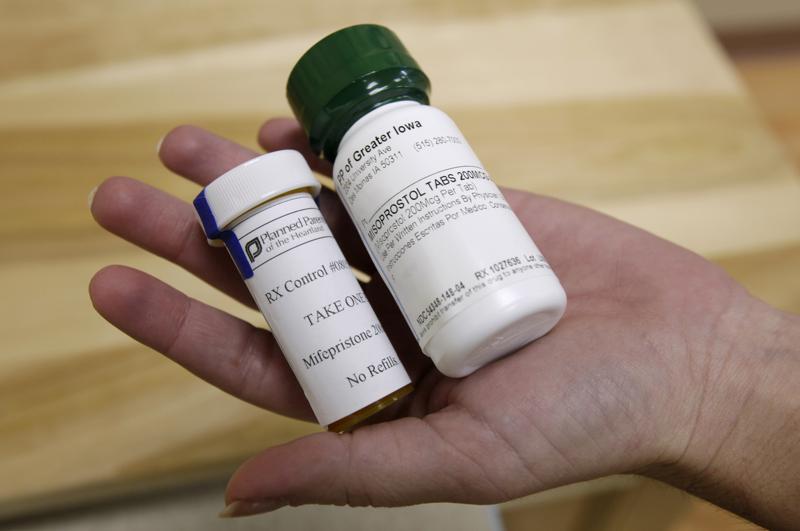AG Steve Marshall leads 16-state brief defending Missouri’s ban on sex-modification procedures for children

Attorney General Steve Marshall filed a multistate brief supporting Missouri’s defense of its ban on sex-modification procedures for children. The 16-state brief, co-led by Alabama, Arkansas, and Tennessee, directly addresses efforts by the World Professional Association for Transgender Health (WPATH) and other medical interest groups that urge courts to defer to them on issues of pediatric sex changes. “In reality, the latest WPATH standards are gender ideology talking points masquerading as medical standards. These so-called standards advocate prescribing some children puberty blockers and having them undergo life-altering surgeries because it is considered ‘medically necessary gender-affirming care,’” said Attorney General Marshall. “Our youth deserve better, and I will never stop fighting to protect our children from these radical and often irreversible medical interventions.” The brief argues that the Constitution entrusts states with the “authority, in truth a responsibility, to look after the health and safety” of children. The brief argues that as European healthcare authorities have sharply restricted access to sex-modification procedures for minors in response to systematic reviews of the evidence, American medical organizations have continued to ignore the evidence and advocate for unfettered access to the procedures. “States like Missouri,” the brief argued, did not have to do the same and “could rationally take the side of caution before permitting irreversible medical treatments” on children. According to their website, the World Professional Association for Transgender Health is a non-profit, interdisciplinary professional and educational organization devoted to transgender health. The organization’s mission is “to promote evidence-based care, education, research, public policy, and respect in transgender health.” The WPATH’s goal is “to further the understanding and treatment of gender dysphoria by professionals in medicine, psychology, law, social work, counseling, psychotherapy, family studies, sociology, anthropology, sexology, speech and voice therapy, and other related fields.” In March, WPATH President Dr. Marci Bowers issued a statement opposing legislation banning access to transgender care. “Anti-transgender health care legislation is not about protections for children but about eliminating transgender persons on a micro and macro scale,” Bowers said. “It is a thinly veiled attempt to enforce the notion of a gender binary.” Attorney General Marshall was joined on the brief by the attorneys general of Arkansas, Tennessee, Alaska, Georgia, Iowa, Kansas, Kentucky, Louisiana, Mississippi, Montana, Nebraska, Oklahoma, South Carolina, Utah, and West Virginia.
Susan B. Anthony group applauds 5th Circuit rebuke of Biden Administration’s mail-order abortion pill order

The Susan B. Anthony Pro-Life America group issued a statement applauding the 5th U.S. Circuit Court of Appeals decision ruling in Alliance for Hippocratic Medicine v. FDA. The Court affirmed the Court’s finding that the FDA likely violated the law when it loosened safety standards on abortion pills and allowed them to be sent through the mail. “The FDA ignored science and its own rules when it rubber-stamped Democrats’ reckless mail-order abortion scheme,” the groups said in a statement. “Americans strongly object to sending abortion drugs through the mail without the in-person supervision of a doctor – that’s common sense. But under multiple Democrat administrations, the FDA threw out common sense and played political games with people’s lives.” “Mail-order abortion pills put thousands of women and girls at risk of serious complications from abortion pills every year,” the group’s statement continued. “We won’t rest until the FDA and the profit-driven abortion industry are held accountable for the suffering they’ve inflicted on women and girls, as well as the deaths of countless unborn children.” The Supreme Court’s ruling affirming that states have the authority to regulate, limit, or prohibit abortions will likely be a major campaign issue in 2024. The group pointed to in-depth polling conducted by CRC Research for SBA Pro-Life America, showing that Americans do not believe the FDA’s assertions that mail-order abortion drugs are safe – including 75% who agree the FDA should have performed studies focused on girls under the age of 18 before approving the abortion pill for minors. Ingrid Skop, M.D., F.A.C.O.G., is a board-certified OB-GYN who has practiced in Texas for nearly 30 years and serves as vice president and director of medical affairs at Charlotte Lozier Institute. Skop wrote in an op-ed, “Like approximately 90 percent of my fellow OB-GYNs, I don’t perform elective abortions. But I’ve personally treated many women for complications from the abortion pill (mifepristone and misoprostol), including performing emergency surgery on a woman who bled for two months after receiving these drugs…Those promoting unsupervised DIY abortion pills clearly prioritize the deaths of unborn children over the health and safety of women. I hope the FDA will once and for all be held accountable to its task of protecting the American public from this dangerous drug.” The pro-abortion Biden Administration is expected to appeal this ruling. Caitlin Connors normally oversees SBA’s southern operations, but she is on maternity leave. While she is away, Katie Glenn Daniel will be supporting the SBA’s southern region in her absence. Daniels reported, “Caitlin and her precious baby girl are doing great and appreciate your prayers.” To connect with the author of this story or to comment, email brandonmreporter@gmail.com.
Alabama Gulf Coast Recovery Council opens a 45-day public comment period – adds $33 million to plan

On Wednesday, the Alabama Gulf Coast Recovery Council (AGCRC) released an amendment to the State Expenditure Plan (SEP) for a 45-day public comment period. The Council is considering adding $33 million to the budgets for the projects due to cost overruns and dropping repairs to the Alabama Point Seawall Repair Project altogether as the cost of the project has proven to be cost prohibitive. The Council is seeking public comment on these proposed changes to the SEP. In 2019, the Gulf Coast Ecosystem Restoration Council (RESTORE) approved the State’s initial SEP. This SEP contained 29 projects totaling approximately $132 Million. All 29 of these projects were found to address one or more goals of the RESTORE Council’s Comprehensive Plan. In 2021, the State’s SEP was amended to add $37,161,000 in contingency funds to augment the budgets of the approved SEP projects and programs in response to cost increases for labor, materials, and other considerations. The planned projects are proving to be even more expensive. This latest amendment to the State’s SEP proposes approving an additional $33,000,000 in contingency funds to further augment the budgets of the approved SEP projects and programs. This is needed due to cost increases for labor, materials, and other considerations. All other projects, programs, and the corresponding details/provisions approved in the initial Alabama SEP remain in full effect. The contingency funding aims to enable approved SEP projects and programs to be completed as previously described in the SEP. These funds are not to be used for new projects or programs or to change the overall scope or objective of approved SEP projects or programs. Proposed repairs to the Alabama Point Seawall have proven too expensive for the AGCRC to accomplish. As a result, this amendment proposes closing the SEP #21 Alabama Point Seawall Repair project without accomplishing the full design and construction. Surveyors discovered that the damage to the seawall structure was more severe than expected. A cost analysis determined the construction budget was not sufficient to cover the full cost of the repairs. If this amendment is approved, then the funds that were appropriated for the Seawall repair will be returned to the contingency fund to be used to cover costs associated with the other 28 SEP projects. The AGCRC was created by the passage of the Resources and Ecosystems Sustainability, Tourist Opportunities, and Revived Economies Act of 2012 (RESTORE Act). The 10-member AGCRC council is headed by the Governor, who serves as the chair. The other members of the Council are; the Director of the Alabama State Port Authority, who serves as vice-chair; the Chairman of the Baldwin County Commission; the President of the Mobile County Commission; and the Mayors of Bayou La Batre, Dauphin Island, Fairhope, Gulf Shores, Mobile, and Orange Beach. The public comment period on this Draft State Expenditure Plan Amendment will be open until October 6, 2023. Comments can be submitted online at agcrc@dcnr.alabama.gov or mailed to: Alabama Gulf Coast Recovery Council, 31115 Five Rivers Boulevard, Spanish Fort, AL 36527. The AGCRC will hold an in-person public meeting on November 1, 2023, at 10 am to vote on the amendment. In addition to the 45-day comment period, public comments will be accepted at the in-person meeting. Comments received by the October 6, 2023 deadline and any received at the public meeting will be reviewed and considered in preparing the Final State Expenditure Plan Amendment. The RESTORE Act was passed in response to the 2010 Deepwater Horizon explosion and oil spill that released millions of gallons of oil into the gulf, killing wildlife and leaving Gulf Coast economies in shambles due to the loss of tourist and seafood revenues. To connect with the author of this story or to comment, email brandonmreporter@gmail.com.
Katie Britt opposes paying $6 billion ransom to Iran

According to multiple media reports, the Biden Administration has negotiated a deal with Iran to swap five “unjustly detained” Americans in exchange for several jailed Iranians and access to approximately $6 billion in sanctioned oil revenue that’s being held in South Korea. When the news broke last week, U.S. Senator Katie Britt (R-Alabama) expressed her concerns that the $6 billion being paid to Iran was “ransom” paid to Iran in exchange for the five captive Americans: “While I will always join my fellow Americans in welcoming home our citizens held hostage around the world, I’m deeply troubled by the naive ‘deal’ the Biden Administration reportedly struck,” Sen. Britt said in a statement. “Handing $6 billion to the world’s largest state sponsor of terrorism is a reckless and dangerous decision that threatens the lives of Americans and our allies across the globe. This appeasement will only embolden our adversaries and invite hostile actors to take more American hostages in the future, as they know doing so could score them massive payouts from this Administration. As we near the anniversary of his disastrous withdrawal from Afghanistan, President [Joe] Biden has once again shown the world that his failed foreign policy is built on a foundation of weakness. It’s time to get back to achieving peace through strength.” The agreement comes after at least two years of negotiations, according to CNN and the New York Times, which first reported various elements of the negotiations. The five Americans all are dual citizens of Iran. They have reportedly been transferred from Iran’s notoriously harsh Evin Prison to a hotel in Tehran, where they will be held for a few weeks under house arrest before being allowed to leave the country. National Security Council spokeswoman Adrienne Watson said that the detained individuals are: · Siamak Namazi · Emad Sharghi · Morad Tahbaz · and two Americans whose families don’t want their identities made public. The ongoing negotiations are considered very dynamic and far from a done deal. The U.S. maintains that these U.S. citizens should have never been detained in the first place. The Iranian regime has a 43-year history of using hostage-taking to advance its foreign policy. Sen. Tom Cotton (R-Arkansas) also opposed the deal. “While we always welcome the release of American hostages − if they are in fact released after President Biden pays Iran $6 billion in ransom − this craven act of appeasement will only embolden the ayatollahs to take more hostages and use these ill-gotten gains to attack our troops, fund terrorism and arm Russia,” said Sen. Cotton. “This cycle will continue until President Biden stops dancing to Iran’s tune and starts responding firmly and decisively to their aggression.” Some conservatives have questioned whether these negotiations with Iran are part of a broader effort to revive the failed Iran nuclear deal negotiated during the Obama administration. Katie Britt was elected to the U.S. Senate in 2022. To connect with the author of this story or to comment, email brandonmreporter@gmail.com.
Alabama Democratic Party infighting case should be dismissed, national party tells judges

The Democratic National Committee asked a federal appeals court on Thursday to dismiss a case centered on Alabama party infighting that could test the requirements of the Voting Rights Act. The DNC argued that the lawsuit, which challenged 2019 bylaws establishing new diversity caucuses, is now moot since the state party is no longer operating under those bylaws. Longtime party official Randy Kelley, who lost his position as vice-chair during the 2019 power struggle, sued the DNC in 2021. Kelly asked a federal judge to declare that the 2019 bylaws violated the Voting Rights Act and a decades-old consent decree meant to ensure Black people are proportionately represented on the party’s executive committee. A judge dismissed the lawsuit, ruling that the state party could not be sued under the Voting Rights Act. But Kelley, who was elected party chairperson last year, appealed to the 11th Circuit. The lawsuit contends that the new bylaws, which added diversity caucuses for youths, disabled people, and LGBTQ+ and other Democratic voters, diluted the influence of Black committee members. In the motion to dismiss the appeal, the DNC argued that Kelley’s complaint is no longer relevant because the party enacted new bylaws in May that abolished some of the caucuses. However, the DNC said it is reviewing a complaint against the new 2023 bylaws. “To be sure, Alabama voters have raised concerns about whether the May 2023 Bylaws were properly enacted under the procedural rules of the SDECA (the state party) and whether the May 2023 Bylaws discriminate against certain minority groups in violation of Democratic Party rules,” lawyers for the DNC wrote. The case comes before the 11th Circuit after courts have recently weighed or dismantled some requirements of the landmark Voting Rights Act. The 11th Circuit in April upheld a Florida election law — tightening rules on mailed ballots, drop boxes, and other popular election methods — that a lower court had ruled was aimed at suppressing Black voters. The long-running struggle for control inside Alabama’s Democratic Party has pitted old-guard powerbrokers against a coalition unhappy with the party’s leadership and performance in the state. Republicans currently hold all statewide offices. The Democratic National Committee in 2019 directed the Alabama Democratic Party to update its bylaws to include diverse voices in party affairs. That led to creating new diversity caucuses. At its May meeting, the state party abolished some of those caucuses, with proponents arguing they were unneeded. Forty Alabama Democrats filed a complaint concerning the May meeting and bylaws adopted during it, indicating they wanted the DNC to review the issue. Republished with the permission of The Associated Press.
Bill would require federal agencies to buy American flags made in U.S.

A bipartisan bill that would require the U.S. government to buy American flags that are made in the U.S. would have little effect on federal spending, according to a new report. The Congressional Budget Office, a nonpartisan federal agency that produces hundreds of cost estimates for proposed legislation each year, reported the cost of implementing the All-American Flag Act would be “insignificant.” “Using information from the General Services Administration and flag vendors, CBO expects that many vendors already meet the bill’s requirements,” according to the agency’s analysis. “CBO estimates that the costs of implementing S. 1973 would be insignificant.” The measure, Senate Bill 1973, would require that all U.S. flags acquired by the federal government be manufactured in the United States from materials grown, produced, or manufactured domestically. U.S. Sens. Sherrod Brown, D-Ohio, Susan Collins, R-Maine, Joe Manchin, D-W.Va., and Gary Peters, D-Mich., introduced the bill in June. “American flags should be made in America, period,” Brown said in a statement when he introduced the bill. “Today, half of the materials that our women and men in uniform fight under can be made in China.” Brown first introduced the legislation in 2011. Many U.S. flags are made in China. Republished with the permission of The Center Square.
Tax revenues increase for the third consecutive month

Alabama’s tax revenues continue to outperform last year’s numbers, as the state brought in nearly 10% more revenue than July 2022 to mark three consecutive months with gains. After a 13.39% reduction in tax revenue from the year before in April, collections have rebounded in May (2.63% gain over the same time last year), June (5.42%), and July (9.97%). The Alabama Department of Revenue reported slightly more than $1 billion in tax receipts in July, compared to $910.6 million in July 2022. For the fiscal year that ends on Sept. 30, the state’s tax collections are up 3.46%, improving from $13.26 billion to $13.72 billion. Corporate income taxes were among the big gainers. Collections added up to 84.7% more in July than the same time last year; the Yellowhammer State collected $67.2 million versus $36.4 million. Also on the increase in July were individual income tax collections, as the state received $230.8 million in July compared to $203.8 million last year, an improvement of 13.27%. Use tax, which is assessed on all out-of-state sales such as online retailers, had a gain of 5.43% compared to July 2022 with revenues of $51.5 million versus $48.9 million. Sales tax revenues were up slightly at 1.49%, going from $275.2 million in July 2022 to $279.3 million this past month. Gasoline tax revenues were also up in July, improving 3.06% to $60.5 million after tallying collections of $58.7 million in July 2022. Cigarette taxes were down by 13.21%, shrinking from $13.5 million in July 2022 to $11.7 million this July. The state’s 2% tax on oil and gas production had a precipitous 60.7% drop in July, going from $1.54 million in July 2022 to slightly more than $608,000 this past month. Republished with the permission of The Center Square.


